Granite A Quarterly Dedicated to Senior Issues and Living
November, December & January 2022-23

November, December & January 2022-23

Mike and Pam Schwotzer were high school sweethearts. They married while attending college. Now in their 70s, the couple looks back on a wonderful life and ahead to a secure future. They’ve resided in their gracious Kensington home for 45 years, thoroughly involved in work, community life and their church. Their plan is to move to a top-end assisted living community when the time is right.
Mike chalks up their financial security
to planning, budgeting and mutual diligence in managing their money.

“We didn’t really start saving significantly until we were in our 40s,” he said, “but you should always start with a budget. First figure out what you need to live on and what you need for fun.”
Mike has been dealing with numbers — the dollars and cents kind — for most of his adult life. His college major was mathematics, leading to a master of business administration degree. He followed that with another graduate degree,
a master of public accounting.
“I discovered a love for accounting. Accounting is essentially math with different rules,” he said.
“Pam and I were high school sweethearts but we went off to different colleges,” Mike said. “We got engaged via mail our freshman year, me in Hawaii and Pam in Washington, D.C. We finally got to the same school, the University
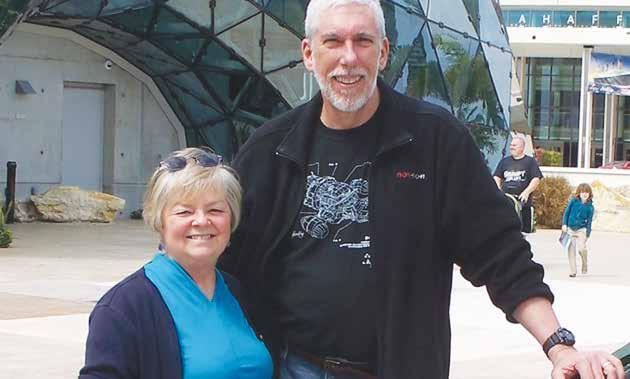
For a man whose job is helping clients plan for the future, Wes Greeley’s career started off without much of a plan at all.
His early experiences ranged from a stint in the U.S. Air Force to taking on his father’s business. Along the way, he did everything from maintaining early IBM mainframe computers to shoveling sawdust.
But looking back now, perhaps it was the best training he could have for what became his life’s work: helping people and businesses plan for the future.
How long? Next summer, Wes will reach a remarkable milestone: 50 years of continuous service for the same company, National Life Group — first as a life insurance agent for predecessor company Vermont Life, but in recent years as
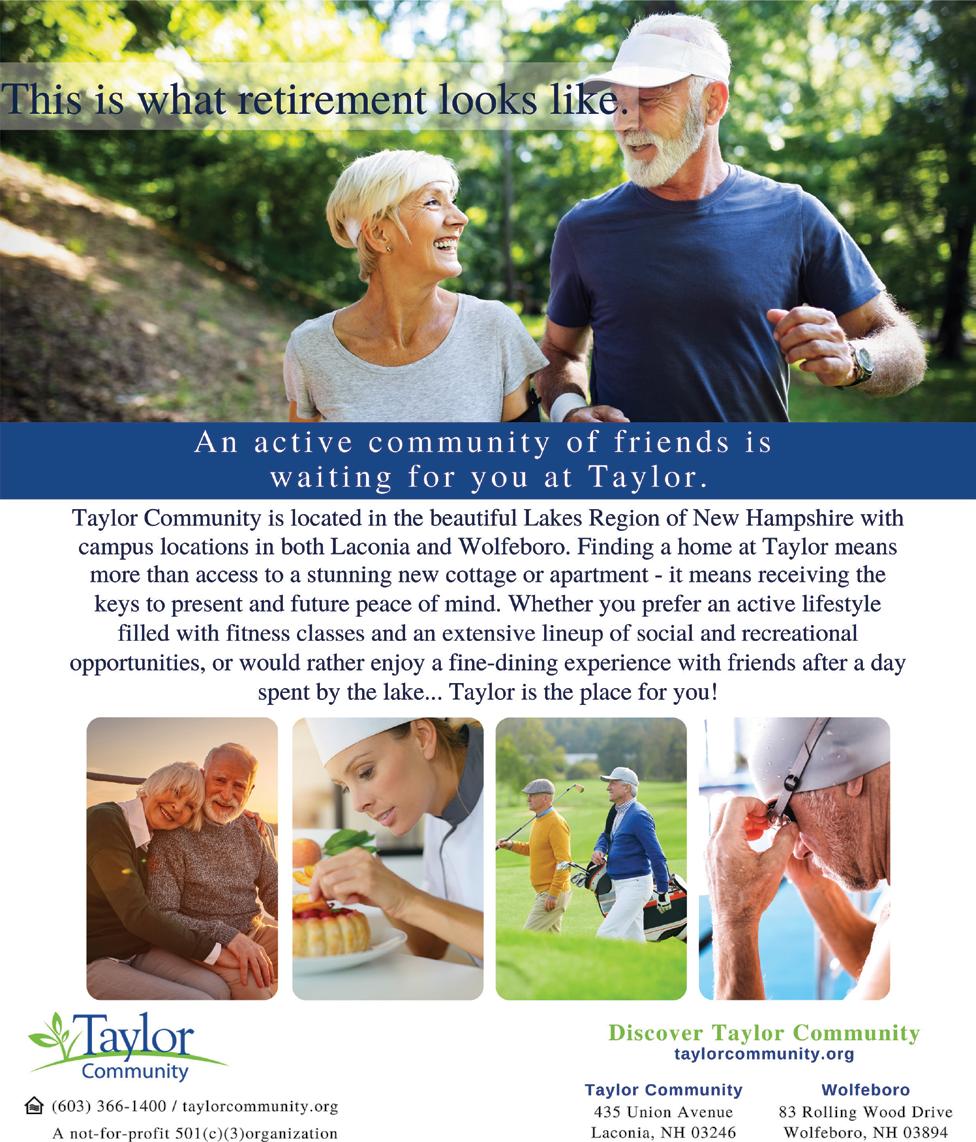
November, December & January 2022-23
A Q UART e RLy De DICAT e D To Se NI o R I SSU e S AND L IVING (1st copy free; 2nd $1) 195 McGregor St., Suite 325, Manchester, N.H. 03102 P 603-625-1855 F 603-625-2422 hippopress.com email: news@hippopress.com
Executive Editor
Amy Diaz, adiaz@hippopress.com
Managing Editor
Angie Sykeny graniteseniorjournal@gmail.com
Editorial Design
Jennifer Gingras hippolayout@gmail.com
Copy Editor
Lisa Parsons, lparsons@hippopress.com
Publisher
Jody Reese, ext. 121 jreese@hippopress.com
Associate Publisher
Dan Szczesny
Associate Publisher
Jeff Rapsis, Ext. 123 jrapsis@hippopress.com
Production
Tristan Collins, Jennifer Gingras
Circulation Manager
Doug Ladd, ext. 135 dladd@hippopress.com
Advertising Manager
Charlene Nichols, ext. 126 cnichols@hippopress.com
Account Executives
Alyse Savage, 603-493-2026 asavage@hippopress.com
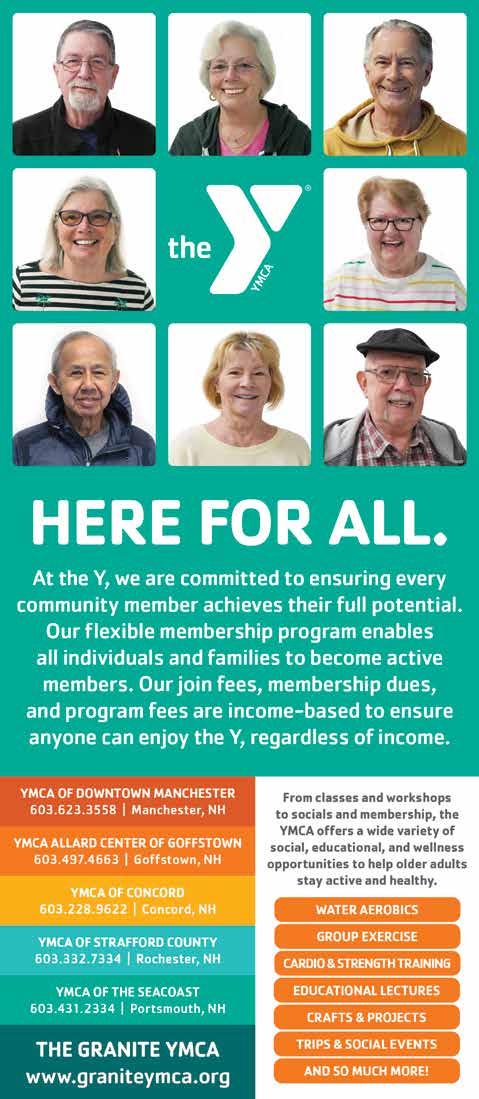
Roxanne Macaig, ext. 127 rmacaig@hippopress.com
Tammie Boucher, support staff, Ext. 150
To place an ad call 625-1855, ext. 126 For Classifieds dial Ext. 150 or e-mail classifieds@hippopress.com
Unsolicited submissions will not be returned or acknowledged and will be destroyed. Opinions expressed by columnists do not represent the views of the Granite Senior Journal or its advertisers.
of New Hampshire, our junior year and married in the fall of our senior year.”
Both got their bachelor’s degrees in 1971, Pam in Spanish and Mike in math. Pam then got her master of library science degree from Simmons College in 1973 and embarked on a library career, capping it with 17 years at the North Hampton public library before retiring.
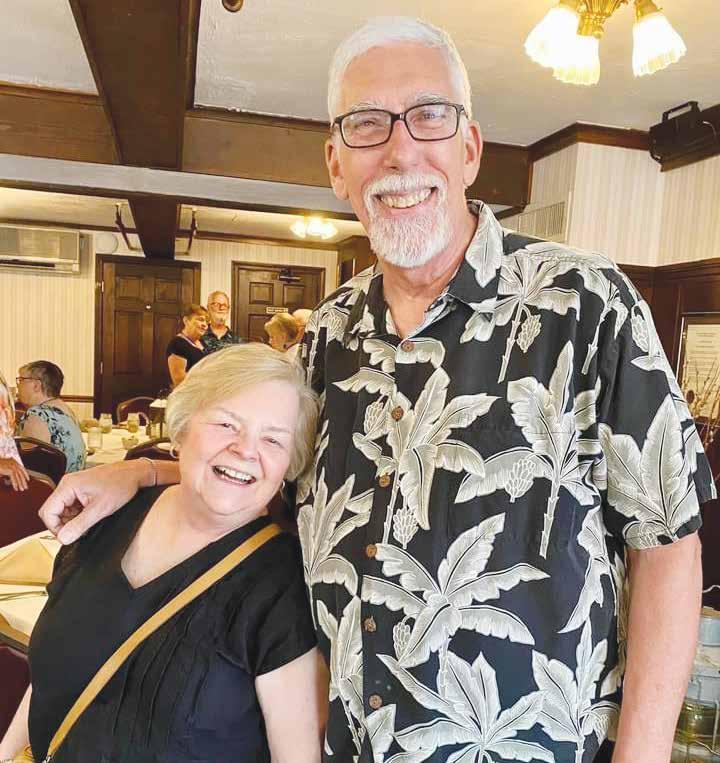
Mike’s first job out of school was a position as Hampton’s health and code inspector. He then went on to work at a computer service company managing accounting information for Simplex Wire and Cable Company in Newington.
The company’s pioneering research in early underwater telegraph and telephone cables led to its instrumental role in fabricating the first trans-Atlantic fiber-optic telephone cable. The fiber-optic cable entered service in 1976, according to referenceforbusiness.com.
Mike was recruited for the Simplex accounting department, where one of the benefits was tuition reimbursement.
“That’s how I earned an MBA in 1979 from UNH,” he said.
He then traveled to Lawrence, Massachusetts, to accept a position as controller for Key Polymer Corporation, an adhesives and coatings manufacturer.
“While I was there I experienced the company being sold three times,” he said. “I kept the same job and office, but I got a different business card each time.”
Mike retired the first time at age 55 and went back to UNH to get a master of public accounting degree. He then went from the private sector to the public sector for his final position and became finance director for the Town of Hampton, where he remained for eight years.
“And the salary was about 10 times greater than my first Hampton job,” Mike said with a smile.
Albert einstein supposedly said the most important force in the universe is compound interest (although some claim the quotation is an urban myth).
“Whether he actually said it or not, I completely agree. It’s probably the most important issue to consider,” Mike said regarding family finances.
Compound interest is interest paid on the interest. For example, if you put $100 in an account offering 5 percent interest compounded yearly, your return after one year is just $5. But by year 10 you’ll accumulate
$162, more than 60 percent growth in your investment.
“The second important issue is knowing the difference between wants and needs,” Mike said. “Needs are what you can’t do without or have to pay for. Wants are expenditures on things you might like but are not absolutely essential.”
The third major issue, Mike said, is getting rid of debt, including your mortgage, as soon as possible.
“This all leads to budgeting. you must budget,” he said. “During your working life, figure out what it costs to live, and by that I mean food, shelter and necessities. Don’t forget the amount you need for debt service. That needs to be in the budget too. Then decide how much to allocate to fun activities like travel, shows, dinners, whatever you like to do.”
Lastly, Mike said, put the remaining money into some form of retirement plan.
“My advice is it’s never too late to start,” he said. “If you’re working and your employer offers a 401(k) matching percentage, put in that amount as a minimum. Leaving one job for another led me to transfer my 401(k) balances to an investment advisor who converted them to Individual Retirement Accounts. At that time I also had a friend that was a member of an investment club that I joined.”
An investment club is a group that pools members’ money, says the Security and exchange Commission. Then the club invests the pooled funds. Club members evaluate options. The club members make investment decisions together, often by vote.
“That’s where I learned about the stock market and researching companies, and I helped choose where the club’s money was
“Couples treat money, incoming and outgoing, very differently,” Mike said. “Pam and I have always had an allowance in our budget, currently $25 per week, that we each spend without having to account for what we bought. If we earn other income, like buying and selling Legos or being a historic house guide, we treat that like an allowance too. It’s our own to spend.”
Baby boomers — those born in an 18-year period after World War II — are the largest age group in American history. Boomers number more than 76 million, according to the nonpartisan Congressional Budget office (CBo). Adequacy of boomers’ retirement income as a group is a big deal for the American economy and for an unprecedented number of senior citizens. It’s also a subject of much economic research.
According to the CBo, researchers sort the adequacy of retirement income questions into two different frameworks. one simply asks whether seniors’ income satisfies basic needs. The second framework sorts out what seniors need to maintain the standard of living they experienced before retirement.
invested,” Mike said. “The small monthly amount required to be part of the club was worth the financial growth, and I made many new friends.”
Get more information on investing clubs at betterinvesting.org.
“other than those amounts, it all belongs to the House,” he continued. “We think of the House as a third person who lives with us. To make any major purchase, all parties must agree. The definition of major purchase is up to you to decide.”
“economists and financial advisers generally use that second definition of what is adequate because large drops in consumption in retirement are considered undesirable.” the CBo reports. “In general, researchers conclude that fewer than 10 percent of retirees will have income below the lowest basic needs threshold — the poverty threshold — while a much larger fraction of people
You must budget. During your working life, figure out what it costs to live ... then decide how much to allocate to fun activities
...
— Mike schwotzerMike and Pam Schwotzer, high school sweethearts now married more than 50 years, retired at age 65 with confidence their finances will support them throughout their lives. Photo courtesy Mike and Pam Schwotzer.
are projected to have income that will fall short of maintaining their preretirement standard of living.”
The current world energy crisis sparked by Russia’s invasion of Ukraine and the economic disruptions caused by the worldwide Covid pandemic are both stoking price inflation and uncertainty about the future, according to Reuters’ Clyde Russell in his recent column. That situation makes household budgeting even more important, Mike said.
“Budgeting may mean lowering your fun money or delaying that vehicle you’d like to have, but do it,” he said. “every month, I put about one-twelfth of each major annual or semi-annual expense into a savings account using a bucket system. on a spreadsheet each expense bucket column is labeled, like taxes, for example. When the bill comes due, we know the money will be there.”
one estimate of what it costs seniors to live in southern New Hampshire is the elder Index. The elder Index was developed by the Gerontology Institute at the University of Massachusetts in Boston. It is calculated annually for every county in the nation. First issued in 2011, it is widely accepted and used
by researchers as an economic yardstick of actual spending habits and costs for elder households.
The index estimates income that old er adults need to meet basic needs and live with dignity. Because of its coun ty-by-county data collection, the index reflects local trends, not national aver ages. But regardless of region, the index factors in the cost of housing, health care, transportation, food and miscel laneous essential expenditures. (It does not include discretionary expenditures like those for recreation, travel or social pursuits.)
Last updated in 2021, the elder Index In Rockingham County for a senior couple in good health with a home mort gage and typical expenses is $4,700 monthly, roughly $56,500 yearly. Hous ing accounts for about 40 percent of that total, health care about 20 percent, food 10 percent, transportation 10 per cent and miscellaneous essentials up to 20 percent. If you own your home with no mortgage, housing expenses are cut roughly in half, knocking the monthly minimum income requirement down to about $3,500. Visit elderindex.org for more information.
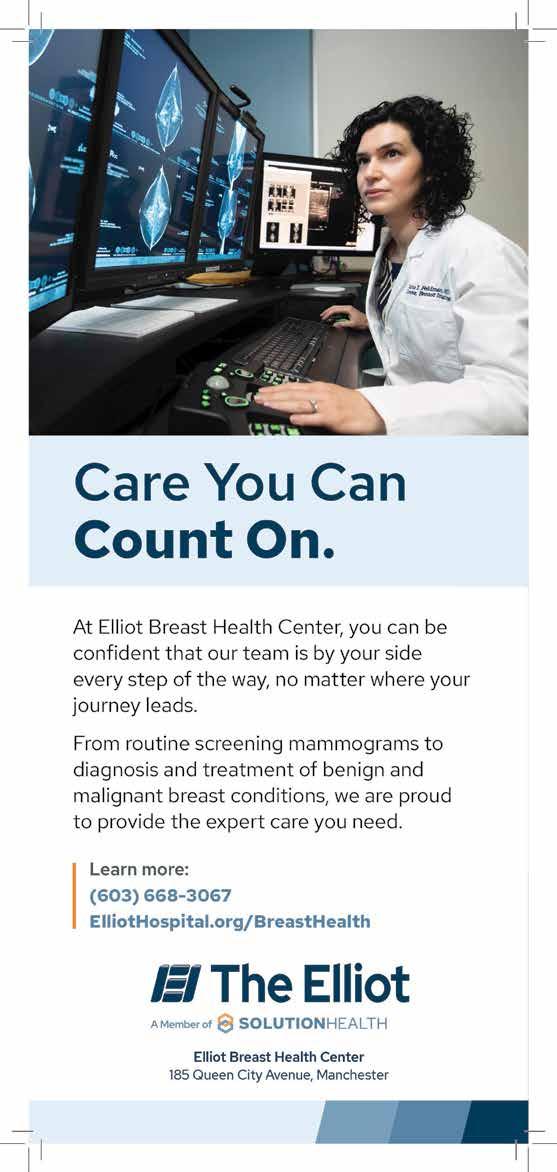
“Housing is necessary but can also be the best investment you make,” Mike said. “We bought a relatively new home
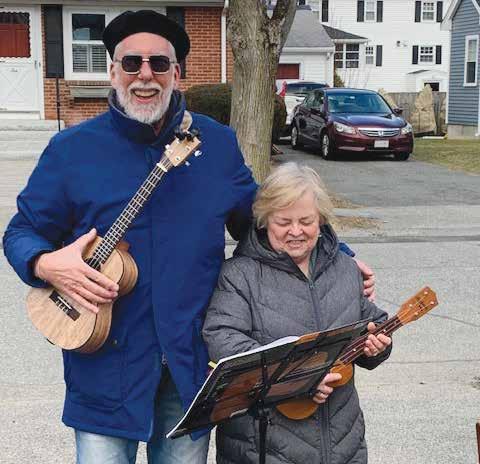
after six apartment years and have been here ever since. Forty-five years have gone by quickly. We’ve done adjustments and additions, but we still love the place. Its sale will be one of the major sources of cash for our coming move to a long-term care community, Riverwoods, in exeter.”
Retirement happens when you choose, Mike said.
“And financially it works the same, except you now get money from Social Security, a pension if you’re lucky enough to have one, and withdrawals from your retirement accounts,” he said.
“We chose to take our Social Security at 65 years old and believe it was the right choice,” he continued. “We’ll be around 90 years old when the reduced benefit penalty catches up. I’ve used a four percent target for the IRA withdrawal hoping the funds earn more than that amount and so, in theory, we won’t run out of money.”
According to the Journal of Retirement, working past Social Security retirement age may theoretically improve financial preparedness, but in
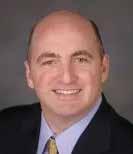
reality it yields much smaller gains than many people assume.
“Working longer improves financial preparedness only for workers who also delay claiming Social Security,” reported the journal. “For many, early claiming is a rational choice because their low and often part-time earnings later fall short of projected post-retirement income.”
Financial planners are not only for those with lots of money; they’re helpful for anyone needing to get financial matters in order.
“I’d encourage seniors to be more active in the process of financial planning during retirement,” said Robert Pagliarini, a certified financial planner, writing for letsmakeaplan.org. “Most retirees think about relaxing, but I’ve found that the happiest and most successful retirees think long and hard about what is going to make them happy in retirement.”

For Mike and Pam Schwotzer, their happy life included leisure spent traveling around the 50 states, climbing the
White Mountain 4,000-footers and visiting parts of europe and South America.
“Theater has always been important to our cultural lives with more than 25 years attending and supporting the Portland Stage Company, the Portsmouth Music Hall, Players’ Ring in Portsmouth and the North Shore Music Theatre in Beverly, Massachusetts,” Mike said. “Lastly, in the summer, you’ll find me on my yellow BMW riding with the Retired old Motorcyclists eating out, the RoMeos, every Thursday when it’s not raining.”
• Comprehensive guide to local services. Visit findhelp.org for an extensive directory of social services and helping programs listed by zip code. Findhelp categories include food, housing, transportation, health, money, education, work, personal care, medical supplies and legal matters. The Findhelp network lists more than 1,500 programs respectively in every zip code in the country.
• ServiceLink Resource Center. ServiceLink is part of the New Hampshire Department of Health and Human
Services, helping people find long-term services and family caregiver information and access Medicare and Medicaid. ServiceLink is New Hampshire’s designated Aging and Disability Resource Center. Call 866-634-9412 or visit servicelink.nh.gov.

• Eldercare Locator. The e ldercare Locator connects you to local sources of information for senior services. Call 800-677-1116 weekdays or visit eldercare.gov.
• Senior information helpline. The New Hampshire Bureau of e lderly and Adult Services (B e AS) connects you to agencies that assist older people. Call 271-9203 or visit dhhs.state.nh.us/ dcbcs/beas/index.htm.
• Legal help. If you need a lawyer but have limited resources, get in touch with the Senior Law Project of New Hampshire Legal Assistance. Call 888-353-9944. you can also visit nhlegalaid.org for more information and a variety of self-help guides.
• Benefits QuickLINK. If you want to get more information about what benefits you may be able to get help with and how to apply, go to Benefits QuickLINK at aarp.org/quicklink.
more of a general financial advisor.

His business card today says “Financial Representative.” At age 82, Wes maintains an active book of business, and has no intentions of retiring.
“No, no,” he says over coffee one recent morning. “No, no no no.”
you can learn something from Wes, who has seen a lot in a half-century of financial planning, and who still gets out on his motorcycle. (His latest: a 2021 Harley-Davidson Heritage Classic.)
So let’s take a ride, so to speak, with Wes, and see how his early experiences helped him find long-term success in a financial planning career.
He’s helped generations of clients plan for that proverbial rainy day, so perhaps it’s fitting that we get together on a recent rainy Monday at the Bedford Starbucks.
Born at the very end of the Great Depression (in late December 1939), Wes is a New Hampshire boy, growing up in Merrimack. Starting grade school a year earlier than most kids, he was able to graduate at age 17, after which he enlisted in the U.S. Air Force.
He vividly recalls flying out of Manchester airport in 1957 as a young recruit on an propellor-driven airliner charted from Braniff Airways. His destination: Lackland Air Force Base outside San Antonio, Texas, and soon after that Biggs Air Force Base in el Paso.
At the time, Biggs was a key Strategic Air Command base, hosting a fleet of bombers and support aircraft kept in a constant state of Cold War readiness, on alert in the event of nuclear attack.
Although he was in the Air Force, Greeley’s role was destined to be earthbound. After basic training, he was given three options: firefighting, diesel engine mechanics or something called “systems support.”
Greeley chose the latter and soon found himself immersed in what turned out to be among the military’s first attempts to use the brand new field of data processing to manage complex operations.
In Greeley’s case, the task was managing the exacting maintenance schedules for the fleet of giant B-52 bombers stationed at Biggs. At the time, the Air
Force was using pre-computer data systems that were more mechanical than digital, but which could automate and manage the processes much more efficiently than by hand.
Greeley’s job was to learn how the various machines worked, and then configure and install the wiring needed for them to work together. It was an early form of networking — a skill that would resurface later in his career, in very different ways.
He enjoyed his time in Texas, which included trips across the border to Juarez in Mexico, where a steak dinner could be had for all of $3, “drinks included,” Wes recalls. once established as a specialist in the new field of “systems support,” he was deployed to other Air Force centers as needed.
“I was always TDy status,” he recalls, using the military acronym for “Temporary Duty.”

It was in the Air Force where Sgt. Greeley first experienced the value of personal connections. While stationed at ellsworth Air Base in South Dakota (not far from Mount Rushmore), a barracks mate helped run the local officer’s Club.
This led to Greeley making regular use of the club’s swimming pool, which in turn led to the friendship of an amiable high-ranking officer.
The officer suggested Greeley might enjoy being stationed somewhere “a little more glamorous.” The next thing he knew, Greeley was posted to Kindley Air Force Base in Bermuda, which had a serious Cold War role to play but also seemed to be the source of most of the military’s liquor supply.
It was a sweet gig. At first he knew no one, but a friend back home in New Hampshire gave him a name to look up once he got settled.
Thus began Greeley’s first adventure in prospecting — something he would do a lot of later on in the life insurance business.
“I got to be a detective and started looking around,” he recalled. “It took some effort. Bermuda is a small island, but it’s not that small.”
Greeley hit paydirt when he met someone who knew his “prospect,” who turned out to be an accountant at the prestigious firm of Pearman Watlington & Co. Ltd.


once found, the man invited Sgt. Greeley to his home that night. Among the attendees was the man’s mother, who turned out to be Bermuda’s equivalent of celebrity chef Julia Child.
A card game then ensued (Wes surmises that might have been the reason he was invited) and turned out to be fairly high-stakes poker, with all bets in the pre-decimal currency of Bermuda pounds and pence.
“It was all tuppence and thruppence and so on,” Greeley recalls. “I learned the money real fast.”
What he also learned was the value of having a name and a little persistence, and also being in the right place at the right time, which could lead to surprising places.
Back at the base, it was more “computer” work, but Greeley emphasizes that in the early 1960s it was nothing like what we call computers today.
“It wasn’t computers at all,” he says. “It was all mechanical.”
Another outgrowth of his time in Bermuda was higher education. The University of Maryland had an extension program on the island, and he began taking classes toward a degree. It was a journey that proved essential, although it would not bear fruit for many years — another example of the value of persistence.
After four years, Greeley, then 21, was leading a team with five people working under him, but his tour of duty was up.
Leaving was not an easy decision: He’d known guys who’d left the security of the service only to reenlist because “they say, ‘yeah, it can be tough out there.’”
But he was ready to return to civilian life and eager to put to use his data processing know-how for businesses just beginning to enter the computer age with mainframes such as the IBM 360.
Greeley returned to his native New Hampshire. For the next few years he followed an IT career that took him from new-wave tech companies such Sanders Associates in Nashua (now part of BAe Systems) to old-line manufacturers such as MKM Mills, a Manchester textile producer.
Along the way, he got married at age 23, which he now acknowledges might have been a little too soon for him. Another life lesson, although one
learned in retrospect. “you should have waited a while, to formulate your life a bit,” he advises his younger self. (He’s now happily married to his third wife.)
Wes eventually wound up at Sprague & Carleton, a well-known maker of rocking chairs and other wooden furniture in Keene. There he saw his first corporate buy-out, when a division was sold to a high-roller from Texas who always wore a fur coat and way too much cologne.
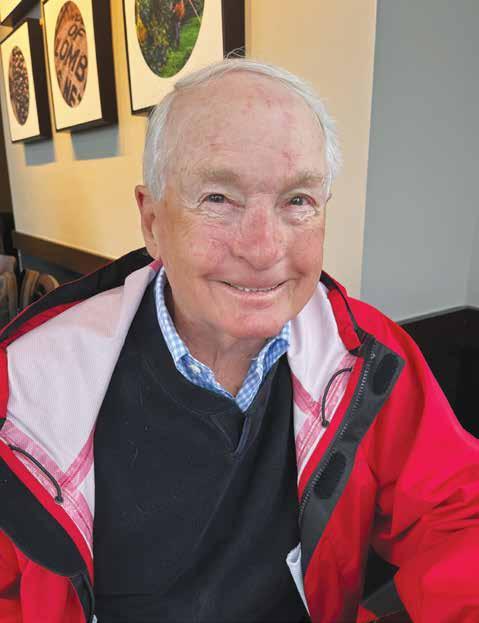
“you could smell the perfume when he wasn’t there,” Greeley recalls.
What Greeley was seeing first-hand was the beginning of the end for many New england-based manufacturers, especially textiles and furniture. even as they attempted to use data processing to automate, they were feeling pressure from cheaper competitors in the nonunion South or from overseas.
It was another lesson: the need to adapt. With his specialty in data processing, he was in a better position than most for that. And his next job was not in
manufacturing but with a business that turned out to have a robust future: direct mail.
Relocating to Braintree, Mass., he began commuting into downtown Boston, working for a company that sold seeds by direct mail, and was also buying and selling customer lists — a business with a lot of upside in the still-new computer age.
But a bad boss drove him to leave.
“Sometimes you win, sometimes you lose,” Wes recalls.
A job possibility with Grossman’s, then a large New england-based hardware and lumber chain, went sour when the recruiter made the faux pas of calling him at his current place of employment.
Greeley then decided to take over his father’s business, which on the surface had nothing to do with data processing. It was sawdust.
yes, sawdust, which to you and me is
something to be swept up and thrown out, but to an entrepreneur represents a business opportunity. Not all sawdust is created equal: Businesses produce many different kinds and types, which can then be sold to other businesses for a good price.
For the next few years Wes operated like a buccaneer, traveling in a truck all over New england, scouting for sawdust producers and trying to match them to buyers of certain kinds, such as farmers who needed one type of sawdust for specialty cattle, or meat processors who needed sawdust to smoke hams.
Get him talking, and Wes will tell you tales of the sawdust business as it was in these parts in the mid-20th century. There was a ready market for sawdust and wood shavings. Manufacturers would buy specific types of sawdust to degrease parts after machining: a great customer for that was the Clark Bros. Bolt & Nut Co. in Connecticut.
Wes gave it his all, even finding new uses for sawdust. In one of his triumphs, he was able to market the copious leftover pine shavings from a plant in Merrimack that produced telephone poles and railroad ties to a nursery in Massachusetts that began selling it as a new landscaping material, thus helping launch the pine bark mulch industry.
“It’s all different now,” Greeley said, thinking back. “Now it’s everywhere, and they have businesses dedicated to turning out mulch in all different colors.”
It was hard work, with Wes himself shoveling literally tons of the material into and out of the truck on a daily basis.
Despite his best efforts, he ran into one obstacle that proved impossible to surmount: a lack of sawdust. With New england manufacturing on the decline, Wes faced what we now would call a “supply chain problem,” he says.
“If you can’t get the product, you’re done,” he said.
So in 1968 he sold the sawdust business, and it was back to data processing, where his skills were even more in demand. His specialty was now helping companies convert from one early system to another — say, the IBM 360 to the latest new machine from Honeywell.
He signed on with a company in Lowell, Mass., which had a giant business seemingly immune to change: printing all the phone books distributed throughout New england as well as parts of New york and Pennsylvania.
Wes stuck around long enough to take courses at Merrimack College in North Andover, Mass., from which he finally got his sheepskin: a bachelor’s degree in business administration. It was a step that would prove crucial to his later journey, as a college degree allowed him to start what we would today call a “side hustle.”
In his off-hours Wes began a new activity: selling mutual funds, which at the time were just beginning to be marketed as a personal finance and estate planning option.
“I liked it a lot — the sales part of it,” Wes recalls.
He enjoyed talking to people, and selling mutual funds provided a reason to talk about something everyone is interested in but which is often regarded as taboo, even today — money and the state of one’s personal finances.
But there was still more data work, including a stint for an early Route 128 tech start-up launched by recent MIT grads. Wes found himself working on projects such as the computerization of all parking tickets in Cambridge, Mass.
All along, however, he continued selling mutual funds on the side, eventually earning his Series 7 securities sales
license and representing the oxford Investment Corp., a Nashua-based partnership started by local business people.
It was something new for him, and Wes liked the feel of it. Through oxford, Greeley first encountered Jim Hatch, a Manchester-based insurance broker who would become his mentor.
It was 1971, and Jim Hatch had a suggestion for the young Greeley: come work for him and represent National Life of Vermont, one of the nation’s most respected insurance underwriters.
Greeley wasn’t quite ready to take the plunge into full-time sales. By the early 1970s he was earning $35,000 per year and building a house in Merrimack. It just wasn’t time for a career change and what would probably mean a big cut in his income, at least until he got established.
So Greeley took a job with Hougton-Mifflin, the giant Boston-based publisher of school textbooks, where he helped develop an inventory control system for their enormous warehouse in Burlington, Mass.
But Jim Hatch kept in touch, and two years later at a meeting at the old Sheraton Wayfarer in Bedford (not far from the Starbucks where Wes is telling the story), Greeley agreed to make it official.
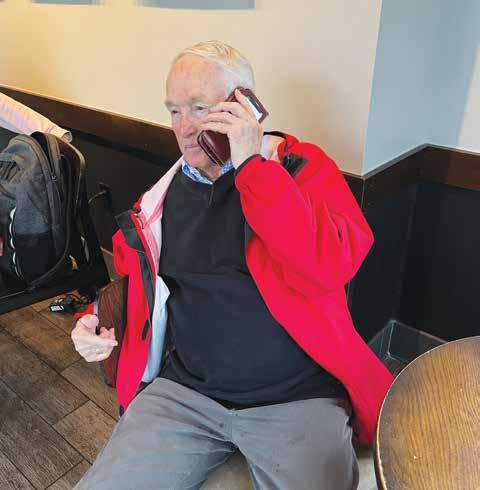
Colonial Poplin, a 50-bed community skilled nursing center situated on 12.5 tree lined acres in the picturesque town of Fremont, NH.
We Believe: The people we care for are our highest priority • In the preservation of Dignity, Self Respect, and Residents’ Rights • In the person-centered approach to care • In encouraging family members to become closely involved
• Medicare and Medicaid Certified

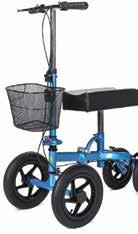
• Prime HMO Affiliations
• Physical, Occupational, Respiratory & Speech Therapy
• Respiratory Therapy
• Advanced wound care management
• Cardio Pulmonary Program
• Treatment of joint replacements
• BI-PAP and C-PAP oversight
• Sub acute services: IV Therapy, PICC, Midline, Peripheral, Central & Portacath
• Geriatric Mental Health Services
• Diverse Life Enrichment Program

• Pain Management
• Respite Care
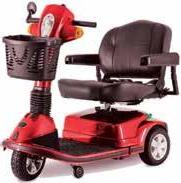
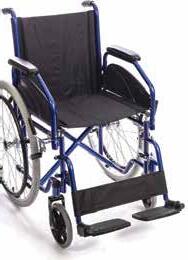
• Poplin Way Assisted living
Our reputation throughout New England is unparalleled with clinical surveys that have always been deficiency free.

His first day as a representative of National Life of Vermont was Aug. 1, 1973 — the start of a run that continues to this day, and will reach 50 years next summer.
In starting what would be his life’s work, Greeley put to use a lot of what he’d picked up along the way. For example: direct mail. For many years, Greeley used mail as the first step in his prospecting efforts.
It wasn’t easy. His first years in the field, he ran straight into the steep business recession of 1974 and 1975 — not a great time to sell business insurance. But Hatch kept him motivated with upbeat advice: even when unemployment is 10 percent, “that means 90 percent of the people are still working,” Wes recalls his mentor saying.
Despite lean times, he remained persistent, refining his methods and also his pitch. Among the lessons: don’t call on a prospect without the name of the right person at the company. Don’t ever talk business on the first call.
It worked. He began landing large clients such as New Hampshire Ball Bearings in Peterborough. Instead of doing their data processing, he was helping the company plan for the future.
But he realized that his early experience helped lay the groundwork for his later success. Instead of networking machines, he was networking with people. While it was not quite the same, he found the process of gradually assembling a system that produced results had much in common.
Today, cruising through his 50th year in the business, Wes has definite opinions.
Like many folks who’ve been out in the world and had full careers, he wonders if
the desire to leave a legacy to their children. But the children, all grown adults, were doing just fine, and didn’t need their parents’ money, Wes recalls.
Coming up: He sees the end of Social Security as we know it as inevitable, when the system runs out of money in about 10 years. Wes believes something will happen to create a substitute for it — but by then he doesn’t expect he’ll be working like he still does today.
As it is, he’s taken to spending a good part of the year in Florida with Susan, his current wife. Though he continues to service a client list, he’s given up his Series 7 license, as the cost of maintaining it exceeded what he could earn by marketing traditional securities.

today’s young people will measure up to the challenges they must face.
He has strong feelings about clients he’s seen who are too conservative in retirement, depriving themselves of the chance to enjoy some of the fruits of their labor.
He cites one couple who resisted spending anything in retirement, out of
But at heart, he’s not a pessimist. He’ll continue looking ahead and giving the world around him the benefit of the doubt.
“I guess a lot of people don’t think about the future,” he says, “but they’re not the people I talk to.”
Full disclosure: HippoPress LLC, publisher of the Granite Senior Journal, is a client of Wes Greeley, and many years ago Mr. Greeley sold the writer a life insurance policy.
I guess a lot of people don’t think about the future, but they’re not the people I talk to.
— Wes Greeley
The inflation rate has reached its highest level since the 1980s, making it difficult for many Americans age 50-plus to afford basic necessities such as rent or mortgage, food, utilities, prescription drugs, gas and more. This is especially true for retirees on a fixed income and for the estimated half of all workers who don’t have access to a retirement plan through their job and have not accumulated adequate savings. The combination of high inflation and lack of adequate retirement savings presents a challenge for older adults and their ability to have the financial resilience they need to adequately take control of their economic health and retirement planning.
It is important to remember that preparing for your financial future is all about achieving the concrete financial milestones that make sense for you. even if these milestones are very modest, each one makes your financial future brighter and more secure.
Personal finance is, well, personal. one size does not fit all. AARP offers some a variety of financial tools and calculators to help folks get a handle on their debt as well as creating a savings plan. In addition to these tools, we also offer regular webinars on Medicare, Social Security, retirement planning and more. Below are some links to our tools. These are free, and you don’t have to be an AARP member to use them, though you may need to set up an account for access.
This collective resource hub is for individuals looking to improve their financial stability. This program consists of different tools that help you learn how to manage unforeseen expenses, create payback strategies for debt, implement saving tactics, spend hard-earned money wisely and reach your financial goals. Link: moneymap.aarp.org
This financial guideline lays out different monthly strategies for you to maximize money management.
Link: bit.ly/wise-money_moves
Home Budget Analysis
This home budget management tool provides in-depth analysis on how much money is being saved from a household’s net income and investment after factoring in different expenses such as mortgage, insurance, groceries, etc.
Link: bit.ly/homebudget-calculator
Social Security Calculator
This calculator provides an estimate of how much you can earn on your Social Security benefits based on your earnings history and age. It also provides strategies to maximize these benefits by choosing the right time to collect them.
Link: bit.ly/social-security-calculator
This interactive tool allows you to calculate how much you’ll contribute in 401(k) toward your retirement based on your saving plans. It also demonstrates the difference in your 401(k) balance with and without employer’s match.
Link: bit.ly/401-k-calculator
This self-assessment tool gives the approximate calculation of how much savings you’ll need for your retirement and how you can earn it based on different factors.
Link:bit.ly/retirement-plan-calculator
This tool helps you to determine what size your retirement nest egg should be.
Link: bit.ly/aarpnestegg
If you have personal debt, this tool will help you determine if debt consolidation is beneficial for you.
Link: bit.ly/debt-consolidation-calculator
This calculator allows you to estimate how much you should make in monthly payment to pay off outstanding credit card balance in certain months based on your payoff goals, interest rates, annual fees and more.
Link: bit.ly/credit-payoff-calculator
This robust tool allows you to break down the financial advantages and disadvantages of renting and buying a house based on your personal circumstances.

Link: bit.ly/rentvsbuy-home-calculator
This tool for homeowners identifies your mortgage rate based on amortization calculation. It will also provide information on how much you should pay monthly to shorten repayment span and cut down on interests.
Link: bit.ly/mortgage-payoff-calculator
Keep your money safe. With AARP as your partner, you’ll learn how to proactively spot scams and get guidance from our fraud specialists if you’ve been targeted. If you can spot a scam, you can stop a scam.
Link: aarp.org/fraudwatchnetwork
It’s never too late to adjust your personal financial plan and take a fresh look at how changes to tax laws, Social Security benefits, health care costs and other expenses are impacting your cost of living. All of these tools and more can be found at aarp. org/tools and will provide you with the support you need to build your financial security.
This article is intended to provide general guidance, not specific legal or financial advice. AARP strongly recommends that you consult a professional financial planner and/or retirement counselor for advice regarding your personal situation.







your hip is hurting. Walking, sleeping, everything seems to cause your hip to hurt. The pain must be coming from your hip joint, correct? Perhaps. Sometimes it can be surprisingly difficult to determine the source of pain. Hip arthritis can cause back, hip and knee pain. Arthritis of the spine can cause back, hip and leg pain. If X-rays show arthritis in multiple areas, where does the pain originate?
The first step is to pay attention to your symptoms so that you can describe them accurately. When do you hurt? All the time or just when walking? Where do you feel pain? Is it down the leg or in the groin or on the outside of the hip? Do your legs feel numb? Is the pain better when you walk with a shopping cart in the grocery store? Does the pain start after you walk a specific distance? These are some questions that your doctor may ask.
What are some causes of hip pain? Pain from hip arthritis is typically located in the groin and may radiate down to the



knee. Some patients lose flexibility and have difficulty putting on their shoes and socks. Bursitis and tendonitis can cause pain on the outside of the hip. Sleeping on your side may be painful and the hip may feel like it is going to give out. Disk herniations cause pain that radiates down the leg. Spinal stenosis is caused by narrowing of the space for the nerves in the back due to arthritic changes. This can cause pain that radiates down both legs. Pain from spinal stenosis is often improved when you lean forward (on a shopping cart, for example). Back and hip pain can also be caused by muscle imbalance or tightness.
To help determine the cause of your pain, your doctor may choose to order X-rays of your hip and/or back. X-rays are very good at showing bony abnormalities and for the diagnosis of arthritis. Sometimes an MRI can also give helpful information. MRI’s will show disc herniations, tendon injuries, and bony abnormalities such as avascular necrosis. However, just because there is an abnormal finding on X-ray or MRI, this may or may not be the source of your
pain. Cortisone injections can provide pain relief and also help to determine if the abnormalities on the imaging studies are causing your pain. Physical therapy is often helpful if muscle imbalance or weakness is contributing.




Not all pain is arthritis and not all patients with arthritis require surgery. But if you are having hip pain that keeps you from doing things you enjoy, talk to your doctor and get evaluated. Find out
where the pain is coming from and what can be done to decrease your pain and improve your mobility. And if you do have hip arthritis, total hip replacement is quite simply life-changing.
Kathleen A. Hogan, MD is a Total Joint Specialist at New Hampshire Orthopedic Center. For additional information on orthopedic care, go to nhoc.com or call 883-0091.
 By Amanda Desmarais, Communications Manager, CASA NH
By Amanda Desmarais, Communications Manager, CASA NH

After the turbulence of the past few years, many of us could use a boost, or just a simple reminder that as individuals we can in fact make a difference. Volunteering is an ideal outlet to get just such a boost, and many nonprofits need a helping hand, including Court Appointed Special Advocates (CASA) of New Hampshire, which is experiencing a critical need for volunteers. CASA is a nonprofit that recruits, trains and supports community volunteers to serve as advocates in district and family courts for children throughout the state who have experienced abuse or neglect.
In 2022, CASA saw an alarming number of cases over the summer — a time when reporting of child abuse typically slows down due to children being out of sight of school professionals. Sadly, this may be a sign of what’s to come; with
the ripple effects of both the ongoing opioid crisis and Covid, we fear that the need will remain high, if not increase. Given this recent trend, it’s all too easy to feel that the problem of child abuse and neglect is too big to tackle. We here at CASA of NH know this isn’t true. In fact, there’s a group of ordinary people who make an enormous difference in the lives of local children every day. And as these caring adults help children find a better future, their own lives are changed for the better as well; their work is challenging, but it is also deeply rewarding. These people are CASA volunteer advocates, and you can join them.
What is a CASA volunteer advocate?
CASA volunteer advocates get to know a child and the important people in that child’s life to provide vital information to help a judge make decisions based on the best interests of the child. CASA volunteers can expect to spend 10 to 15 hours a month over the life of

a case, which currently average about two years. Those hours are spent visiting with the child; gathering information from teachers, parents, foster parents and other important people in the child’s life; writing court reports and attending court hearings. over 60 percent of CASA volunteers are age 60 or older, and over a third are retired. Howev-
er, plenty of CASA volunteers — about 40 percent — balance their CASA work while working full time.
Putting your talents to work
While being a CASA is a larger commitment than other volunteer opportunities, volunteers say when working





 By Terry Lemerond Founder and President of Terry Naturally
By Terry Lemerond Founder and President of Terry Naturally
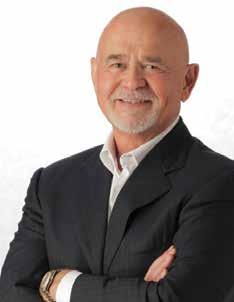
Prescription and over-the-counter painkillers are dangerous; they damage the liver, kidneys and stomach lining and cause side effects that interfere with daily life. This latest research shows that the right curcumin is a valid choice for people suffering from osteoarthritis. It doesn’t just stop pain — it stops the damage caused by inflammation that leads to pain in the first place. If you deal with arthritis yourself, or know someone who does, introduce them to the curcumin tested here. It could make a world of difference.
Safety and efficacy of curcumin versus diclofenac in knee osteoarthritis: a randomized open-label parallel-arm study
(NSAIDs) Shep D, Khanwelkar C, Gade P, Karad S. Trials. 2019;20(1):214
Background: The purpose of this study was to compare the efficacy and safety of curcumin with those of diclofenac in the treatment of knee osteoarthritis (oA).
Methods: In this randomized, open-label, parallel, active controlled clinical study, 139 patients with knee oA were randomly assigned to receive either a curcumin 500 mg (BCM-95®) capsule three times daily or a diclofenac 50 mg tablet two times daily for 28 days. Patients underwent assessment at baseline days 7, 14 and 28. The main outcome measure was severity of pain using visual analogue scale score at days 14 and 28. Knee Injury and osteoarthritis outcome Score (KooS) (at days 14 and 28), anti-flatulent effect (at day 7), anti-ulcer effect, weight-lowering effect and patient’s and physician’s global assessment of therapy at day 28 were included as secondary outcome measures. Safety after treatment was evaluated by recording adverse events and laboratory investigation.

Results: At days 14 and 28, patients receiving curcumin showed similar improvement in severity of pain and KooS scale when compared with diclofenac, and the difference was not statistically significant. At day 7, the patients who received curcumin experienced a significantly greater reduction in the number of episodes of flatulence compared with diclofenac (P <0.01). At day 28, a weight-lowering effect (P
<0.01) and anti-ulcer effect (P <0.01) of curcumin were observed. None of the patients required H2 blockers in the curcumin group, and 19 patients required H2 blockers in the diclofenac group (0 percent versus 28 percent, respectively; P <0.01). Adverse effects were significantly less in the curcumin group (13 percent versus 38 percent in the diclofenac group; P <0.01). Patient’s and physician’s global assessment of therapy was similar in the two treatment groups.
Conclusion: Curcumin has similar efficacy to diclofenac but demonstrated better tolerance among patients with knee oA. Curcumin can be an alternative treatment option in the patients with knee oA who are intolerant to the side effects of non-steroidal anti-inflammatory drugs.
The most commonly used drugs for osteoarthritis are called non-steroidal anti-inflammatory drugs, or NSAIDs. The over-the-counter versions are products like ibuprofen and naproxen sodium, but there are prescription-strength NSAIDs as well. The problem with these drugs is their side effect profile, which includes stomach ulcers, gastrointestinal bleeding and an increased
risk of heart attack and stroke. Despite these serious side effects, many people think they are the only option. This study proves that curcumin worked as well as the prescription NSAID drug, but without the risk. Curcumin relieves pain and also stops inflammatory damage to the joints through many pathways, helping your body heal and not just masking underlying problems. This clinical study compared a curcumin blended with turmeric essential oil, a source of ar-turmerone (BCM-95®), which enhances its absorption and blood retention, to a commonly used prescription NSAID drug, diclofenac sodium (one brand name for this drug is Voltaren).
Sign up for Terry’s free weekly newsletter or listen to the radio show at terrytalksnutrition.com. CuraMed and other Terry Naturally Europharma products are available at Granite State Naturals (170 N. State St., Concord). Call 224-9341. The staff is happy to help you navigate the options.
Imagine a wide-open calendar, the option to say “Yes!” to anything, and the ability to exclusively focus on the things you truly love. What does that day look like? Where are you? What are you doing? Who are you doing it with? Can you imagine what spending every day in that moment would do for your stress levels, your wellbeing, and your outlook for the future?
Planning to live your best life every day isn’t wishful thinking – it’s The Arcadia Way™.
Too many people are sleepwalking through their finances. Arcadia Financial likes to shake people awake to see, sometimes for the first time, what’s truly possible in life. We help open your eyes to the truth, to what could be if you live life without fear or apology. If you want that best life, you need to invest in yourself. Get educated. Take action. That’s what gets you to living in weekends-only mode. We call that The Arcadia Way™, our proprietary process designed to rewrite your calendar to weekends-only mode. You don’t need another sales pitch or gimmick. We help our clients identify mistakes, overcome obstacles, and optimize their finances so they can retire with confidence. That means leaving no stone unturned. Income, healthcare, investments, taxes, and legal protection – we cover it all.
When you know everything is in its proper place, that’s when you can begin to live every day like it’s the weekend.
We believe in always doing the right thing. No excuses. No deviation.
We believe in treating you like a person, not a portfolio.
We believe in community and the power of positivity. We love our clients and take every opportunity to help, educate and empower them.
We believe time is more valuable than money. Creating memories and living your best life is far more important than numbers on a piece of paper.
With solid planning, focused work, and an insatiable appetite for independence, you can write your own destiny. No more confusion. No more tending to unwanted obligations. No more regrets. The only question is, “Why not?”
With Arcadia Financial, your life will

never be the same. One element that makes Arcadia Financial different than other firms is that we live, breathe, and embody our mission and core values. It is incredibly important to us to give back to our local community. Our team volunteers quarterly and we invite our clients to join in on the opportunities with us. Most recently we participated in the 2022 Day of Caring which was organized by Granite United Way.
Day of Caring is a community-wide effort that brings together volunteers and local businesses to provide shortterm, project-focused volunteer service to our community’s local nonprofit and public organizations. Day of Caring gives volunteers an opportunity to assist community organizations in achieving
their goals, learn more about solutions to community issues, and experience the intrinsic rewards of contributing to the well-being of our region.

The Arcadia Team and a few of their clients spent time volunteering at Camp Allen. Camp Allen is an overnight and day summer camp that provides opportunities for friendship, growth and fun for children and adults with developmental and/or physical disabilities in an outdoor environment.
We have often found that we spend more time talking to our clients about life than money. A common theme we’ve identified is that our clients are just as passionate about giving back to the local community as we are. We are on a mission to make the largest impact and help uplift everyone around us.
When considering whether to hire an in-home caregiver, one of the first things you may ask is how you will pay for home care costs.

Medicare and private health insurance plans do not cover in-home personal care services. you may qualify for coverage through your state’s Medicaid program. eligibility criteria and benefits vary by state, but you may only qualify for it after you deplete most of your savings.
Long-term care insurance policies, on the other hand, can cover the care costs if you — or a loved one — develop a chronic medical condition, disability or cognitive problem such as dementia.
Purchasing a long-term care insurance policy is similar to obtaining a life insurance policy. An insurance agent or company representative will ask you to complete an application and answer health questions. The insurance company will review your applica-
tion and medical records and determine the cost of your coverage if you are approved.
Don’t wait too long to purchase a longterm care insurance policy. Most insurers won’t issue policies for people over age 75 or who are living with a debilitating condition. Most people purchase long-term care insurance in their 50s and early 60s to protect their savings and ensure they can receive quality senior care if needed.
Generally, younger people in good health pay lower premiums. However, it’s important to remember each policy provides different coverage limits, benefits and options with different price tags.
How does long-term care insurance work?
While each insurance policy is different, most will be “triggered” if you can’t perform two or more activities of daily living, such as bathing, toileting, dressing, eating or transferring — or if you develop cognitive impairment.
If you (or a loved one) meet the triggering criteria and need care, you will need to file a claim with your insurance company, which may ask for medical documentation and a
copy of your care plan. An insurance company representative may also send a nurse to evaluate your condition.
Most long-term care insurance policies require you to pay for your care out-of-pocket for a period of time — usually 30, 60 or 90 days — before the insurance benefits kick in and will have a daily benefit limit and a lifetime-maximum benefit.
Many long-term care insurance policies will reimburse a daily dollar amount to pay for services to assist with activities of daily living. However, your individual policy will determine:
• Amount paid out
• How the benefit is paid
• How long the benefits last
Can long-term care insurance pay for home care?
yes, depending on your individual policy, you may be able to use long-term care insurance to pay for in-home personal care.
Long-term care insurance is a tool that can finance in-home personal care services, but you should understand what your policy covers and how to file a claim.
A home care coordinator can provide
you with a copy of a care plan, which may be required by the insurance company as proof of services provided. A care coordinator may be able to assist you with filing a claim, but some insurance companies may require you to complete and submit claim forms yourself.
Reach out to your nearest Visiting Angels office. Visiting Angels’ care coordinators are familiar with long-term care insurance and will meet with you to discuss your insurance situation during a free home care consultation.
If you’re interested in our compassionate home care services for you or a loved one, contact your nearest Visiting Angels home care agency today or call 800-365-4189.

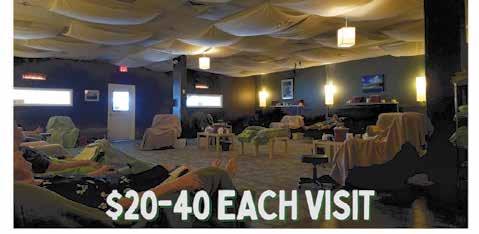
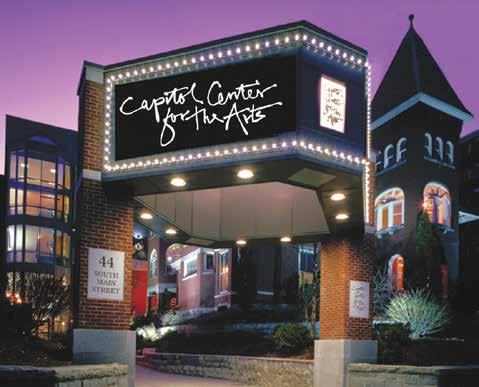 By Troy Cromwell, Marketing and Development Coordinator, Capitol Center for the Arts
By Troy Cromwell, Marketing and Development Coordinator, Capitol Center for the Arts

The Capitol Center for the Arts is a place where people can come together to celebrate Concord’s greatest achievements. We are a catalyst for performance, creation and learning that strives to be one of New Hampshire’s most inclusive and innovative venues. We aim to provide access to the arts for everyone. We believe that the arts have the power to transform lives, build community and inspire creativity.
The Capitol Center for the Arts strives to be one of the most innovative and inclusive venues in New Hampshire. We offer a variety of performances, creation opportunities and learning experiences that bring people together to celebrate one of Concord’s greatest achievements.
We invite you to come and experience all that the Capitol Center for the Arts has to offer.
Whether you support our organization as a patron, as a member or aspire to

perform on one of our stages, our purpose is to make life more meaningful, to create memorable experiences and bring entertainment to everyone.
The Capitol Center for the Arts has been a staple in Concord for over 30 years. We have seen countless performances and exhibitions gracing our stages and galleries. The Capitol Center is more than just a venue – we are a community.
We would like to invite you to join us as we continue to enrich the lives of those who live, work and visit Concord.

Please join us in our mission to “inspire, educate and entertain … and serve as a resource and gathering place for the community at large.”
There are many ways that you can become involved with the Capitol Center for the Arts. We offer a variety of memberships as well as opportunities to volunteer your time and talents. We also welcome corporate sponsorships and donations.
Members are the heart of the Capitol Center for the Arts and the Bank of New Hampshire Stage. As a nonprof

it organization, ticket sales only cover a portion of our operating costs, made even more challenging during this time of Covid-19. It is our members and
the Arts and Bank of New Hampshire Stage alive as we continue to navigate these uncertain and changeable days. your support makes it possible for us to
of world-class performing arts to this community.
We offer a variety of membership levels to fit any budget, and each comes with its own set of perks and benefits. As a Capitol Center member, you will also be supporting the important work that we do in the community, such as our award-winning education programs and free public events.
Want early access to the best seats in the theater? Ticketing insurance for a performance you just can’t make? Invitations to member events with local philanthropists? Become a member today. Capitol Center members always have exclusive access to the best seats in the house for every show.
We are grateful for our members and everything they do to support the performing arts in Concord.

our volunteers are responsible for patron comfort and safety before, during and after the performance. They assist in enforcing our policies, as well
as evacuating the theater in the case of an emergency. We are always looking for friendly, outgoing and reliable people to join our volunteer team.
Capitol Center for the Arts is a non-profit 501(c)(3) organization. We rely on the support of our community to maintain our operations. If you are interested in joining the Capitol Center for the Arts as a member or volunteer, please call 225-1111 or email info@ccanh.com. We would love to hear from you.
As we enter our third decade bringing you the performing arts, we want to sincerely thank our generous patrons, supporters and volunteers. Concord’s history is intertwined with the arts, and we are proud to play a role in keeping that tradition alive. We have so many people to thank for making the Capitol Center what it is today.
Thank you for your continued support of the Capitol Center for the Arts. We look forward to seeing you at our next event.
on such an important issue, it becomes natural to carve out the time. As one volunteer described it, “If you can make an hour or two in your week, this is something you can do.”
It also offers an opportunity for people to put many of the skills they already use in their careers to work and to develop new ones. Being a CASA volunteer doesn’t require a certain professional background or legal expertise. If you care about children, CASA staff can teach you the skills you need.
Volunteering can often be a way for people to foster new connections, and being a CASA volunteer is no different. In addition to support from staff program managers, volunteers also have peer coordinators, who are experienced fellow CASA volunteers they can connect with when they have questions. CASA volunteers can also go to support groups where they can meet other volunteers, share tips and learn new skills.
Being a CASA volunteer advocate isn’t easy work, but a common theme CASAs mention is connecting to the
larger purpose of their work. o ne volunteer wrote, “The work can be frustrating and even heartbreaking, but it is necessary, and you may be the one person in the life of a child that gives them hope and a model to move forward.”
Another long-time CASA volunteer described how over the course of the years, even though the children on his cases may not remember him, they will remember there was a CASA for them when they needed one the most. More than one volunteer has remarked on how they entered this work expecting to make a difference to a child, only to find that their own lives were impacted as well.
The reality is that ordinary people can do extraordinary things for children who have experienced abuse and neglect. The staff at CASA witness it every day. With CASA’s excellent, thorough training and support system, those who want to make an incredible, lifelong difference for victimized children in their communities can do so right now.
If you are interested in learning more about becoming a CASA volunteer, sign up for one of our virtual info sessions at casanh.org/infosessions.

Can you imagine hearing a constant ringing in one or both ears? It might go to the background for parts of the day and then when all is quiet it comes roaring back. It might even interfere with your ability to sleep, concentrate or enjoy quiet activities. For more than 50 million Americans this condition, called tinnitus, is a maddening daily struggle. At Dr. Woods Hearing Center we have noticed an uptick of tinnitus patients seemingly as a result of either Covid-19 infection or due to the Covid vaccine. According to an article published by the Cleveland Clinic on May 24, 2021 in the International Journal of Audiology, scientists estimated that 7.6 percent of people infected with Covid-19 experienced hearing loss, 14.8 percent suffered from tinnitus and 7.2 percent reported vertigo.
Many people have struggled to find a resolution to the ringing in their ears since there are no medical cures for the disorder, meaning there is no medication or surgery that has proven to treat tinnitus.
This does not mean that patients cannot find relief from their symptoms, as there are non-medical solutions that have a high success rate for tinnitus relief. Dr. Woods is one of 46 tinnitus specialists in the country who completed a postdoctoral study under the renowned neuroscientist Dr. Pawel Jastreboff at emory University. She is uniquely positioned to offer a multipronged approach to tinnitus relief which currently has an 85 percent success rate with tinnitus patients.

If you notice that you are having trouble with tinnitus, hearing or balance, don’t
ignore what is going on. The sooner you reach out for help, the better. Dr. Woods says that sudden changes in your hearing should be considered a medical emergency and need to be addressed immediately. In most cases, tinnitus is the result of damage to the inner ear. When the inner ear is not working properly and sending messages up to the brain as it should, the brain compensates and creates sound which is perceived as tinnitus. For patients, this can be ringing, buzzing, humming or even hearing music that is not present in the environment. In rare cases, tinnitus can occur as a rhythmic pulsing or whooshing sound, often in time with your heartbeat. This is called pulsatile tinnitus and can be an indication of a medical condition with the jugular vein or carotid artery and needs to be further evaluated.
In many people, tinnitus is caused by one of the following:
• Hearing loss. Decreased hearing causes the brain to compensate and create tinnitus.
• Ear infection or ear canal blockage. Any time that the ear is blocked, it causes a decrease in hearing and can cause tinnitus.
• Head or neck injuries. Head or neck trauma (concussion, whiplash, etc.) can affect the auditory nerve (hearing nerve), causing tinnitus.
• Medications. A number of medications are ototoxic (toxic to the inner ear) which can cause hearing loss, tinnitus and balance disturbances.
• Other causes of tinnitus, such as Meniere’s disease, allergies that cause eustachian tube dysfunction, temporomandibular joint disorders (TMJ), head and neck tumors, blood vessel disorders, diabetes, high blood pressure, anemia, migraine and arthritis have all been associated with tinnitus.
Tinnitus is not something that you just have to live with. If you are experiencing aggravation, annoyance, anxiety or depression as a result of your tinnitus, it is important to reach out to us to make sure you explore the potential cause and treatment available so that it can be managed. There is help and there is hope. Please reach out to our office at 889-7434 to schedule an appointment. We look forward to helping you make life sound better.

Meet yMCA of Greater Nashua members Dianne West and Marty Thebodeau — two self-proclaimed pickleball ambassadors.
Having retired in 2019, both would happily play the game seven days a week if they could, and they can’t say enough positive things about the sport.
“A friend of mine is a pickleball player, and she suggested I give it a try,” West said. “I was hooked right away. It is really addictive, and it is easier than tennis, which is harder on the knees and joints. In fact, many players are former tennis players, and some play both sports.”
West and Thebodeau both said that pickleball appeals to the older community, although it has more recently attracted younger generations, and they are very happy about that.
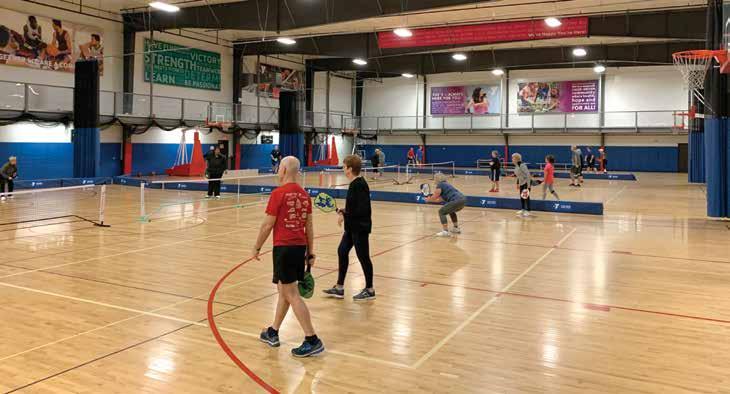
“you still get plenty of exercise, but it’s just not as stressful on the body, and it is a very social game,” West said.
“The Nashua Area Group is a very positive pickleball family that consists of kind people who play at various levels
At the YMCA of Greater Nashua we give you the support and encouragement you need to become a healthier, happier you!
• Exercise Classes including Zumba & Yoga
• Swimming and Water Aerobics
• Book Clubs and Senior Events
• Pickleball and Racquet Ball
• Community Events and Gatherings
• YMCA Diabetes Prevention Program
• LiveStrong at the Y
• And More! www.nmymca.org/joinus
er regardless of their level of play. The game is full of energy.”
“Pickleball at the y is quite popu -
Mac e achern, who teaches Pickleball 101 at the Westwood Park y. “A lot of people enjoy the game because it’s

their own pace. It is a bit more leisurely than playing tennis and is mainly played as doubles. In our classes, we teach doubles because that is the more common format than singles. There is half as much court space that players have to cover and that makes the game more accessible than some other sports. We go over the basics of serving, rallying, volleying, dinking — hitting the ball lightly over the net — and scoring. It takes about two to three classes to learn the game, and we put all that into practice by playing scrimmages that last 10 to 15 minutes. When first learning about pickleball, the scoring can be confusing because the server announces three numbers, which is why I receive thanks for us being patient while they learn about scoring.”
West and Thebodeau are excited that pickleball player Steve Harriman is joining the y as another instructor. They said Steve is a great player who has a lot of knowledge, and he will be a teacher to beginner and intermediate players who will gain solid instruction.
Thebodeau shares West’s enthusiasm for the sport.
“When I retired in January of 2019, I met two golf friends at the Westwood Park y because they said, ‘ you just have to come to the y to learn how to play,’” she said. “I was addicted after my first visit, and I signed up to be a y member right then and there.”
Tending to love sports and exercise, Thebodeau enjoys the camaraderie and the new friendships she has made.
“Quite honestly, I didn’t even know about pickleball before this, and I 100 percent welcomed the pickleball experience,” she said. “Frankly, I don’t know what I’d do if I didn’t have pickleball in my life.”
These two y members hit it off from the get-go, and three years ago they began issuing what initially was a newsletter and is now more like a little magazine, with the idea that it would keep all of the players connected year-round. The total number of readers started at 20 and has grown to 320.
They also chatted about starting a charitable endeavor and agreed to collect brand new clothing for mothers and their children who have been given temporary housing at Marguerite’s
Place in Nashua. The effort is named “ o peration Warm and Fuzzy,” and they have already started the collection this fall, which is its third year.
“When I worked for a local police department, I heard prosecutors speaking highly of Marguerite’s Place,” West said.

“I have known about Marguerite’s Place and feel that it is definitely a worthy cause,” Thebodeau added.
If people don’t want to shop, they donate cash, and Thebodeau does the shopping.
“It feels like we can make a difference,” West said.
Last year, about $1,400 worth of new hats, mittens, warm pajamas, scarves, socks and jackets were donated.
The game of pickleball is played by many Nashua-area people — many of whom are y members — on outdoor courts during the milder months. They, along with West and Thebodeau, are very happy about the additional pickleball court time on Sunday mornings.
Starting this month at the Westwood Park y, pickleball hours are expanded.
Monday through Friday:


• Six courts
• 6 to 8 a.m., 8 to 10 a.m., 10 a.m. to noon

Friday:
• Four courts
• 5 to 7 p.m.
Sunday:
• Four courts
• 8:30 to 10:30 a.m., 10:30 a.m. to 12:30 p.m.

To learn more about pickleball at the Westwood Park Y, contact Andy MacEachern at amacearchern@ nmymca.org or call 402-2258. To register for beginner or intermediate pickleball classes, visit operations.daxko.com/online/5286/programsv2/search. mvc?keywords=pickleball.

We just polished off Friday supper. Beans and franks, canned brown bread, tall glass of milk and banana pudding.
It’s 1961. I’m 9 years old. My brother, across the table, is 7. Mom and Dad, in their late 20s, are at each end of the Formica-topped dining room table. We’re at home in a new two-bedroom ranch house in Salem, still a town of just a few thousand, boasting two main attractions: the lush and sprawling Rockingham Park thoroughbred racetrack and Canobie Lake Park, where Ted Herbert’s big band from Manchester is a favorite for ballroom dancers. (Big-name rock ’n’ roll shows that attracted thousands of teens are yet to come to the expansive lakeside ballroom.)
With supper officially declared over by Pop with the perfunctory “you boys are excused,” my little brother and I are in pajamas as quick as we can throw them on. Teeth receive a quick brushing with Ipana (Bucky Beaver’s favorite.) Then, with sleeping bags in hand, we are ready for a trip to the drive-in theater.
The pale green Studebaker Lark station wagon awaits My kid brother and I bolt at roughly half the speed of sound to be first to claim prime real estate in the “way back.” Mom sits up front, Dad behind the wheel of course, a cooler with ham sandwiches and bottles of Moxie, a
big tin of Granite State potato chips, a few rolls of Necco wafers and boxes of Good & Plenty all secure on the front bench seat.
This night we’ll go extra miles to catch a first-run feature just out. The newly released Disney movie Swiss Family Robinson is the draw, very popular with all ages after its premiere in first-run movie houses the year before.

After World War II, drive-in theaters boomed, cheap to construct compared to movie houses. More than a thousand entrepreneurs built drive-ins in the four years after the war, according to the United Drive-in Theater owners Association, peaking in 1958 at more than 4,000 nationwide. (The exact number of New Hampshire drive-ins operating during the boom years is not readily available.)
Families could pack up the kids and not worry about babysitters. Admission by the carload was a bargain compared to movie houses. Most drive-ins were doing capacity business during the boom years, says clickamericana.com.
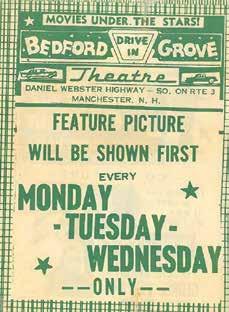
Drive-ins also attracted patrons that indoor theaters didn’t accommodate. The physically handicapped, invalids, convalescents, old people, expectant mothers and parents with infants all found the drive-in a welcoming entertainment destination. you could dress as you pleased, carry on a conversation, adjust your own ventilation, eat and drink what you wanted, stretch out on larger comfortable seats with more legroom and enjoy privacy in your own vehicle.
Dad backed the Studebaker into a good spot about halfway back in the gravel lot. The last few rows of the automobile arena were already packed with lovebirds who likely had less interest in what was on the screen than what was on their minds.
The iconic aluminum-encased speaker was hung by its crook on the driver’s window. These units were pretty much indestructible, although their cables were not. When it was time to leave, some forgetful driver would almost always drive off with the speaker still
hung on the window, motoring off, trailing six feet of torn wires.
on screen the countdown film clip showed 15 minutes until the show starts, plenty of time for my brother and me to dash to the playground next to the snack stand. Seesaws, swings and a slide were already in use by dozens of kids also clad in pajamas. An imposing matron was on duty trying to maintain order among the hyperactive throng of whippersnappers, mostly boys. No family drive-in wanted to be known for lax rules or misbehavior, of course.
Soon the countdown reached five minutes until showtime, our cue to beat it back to the car. Stars began to appear in the clear sky. The projectionist rolled the animated clips touting french fries, talking burgers and hot dogs, pizza with a cartoon Italian chef and hot buttered popcorn available in the snack stand. The sound issuing from each speaker combined to resonate throughout the lot, creating an eerie echo effect. After cartoons, a short travelogue about life in some distant land and one more snack bar promo, it was time for the feature film we’d come for.
Swiss Family Robinson remains in my memory as a terrific flick. A fantasy tale of a shipwrecked family stranded on an island, it was fraught with dangerous animals, pirates and other threats to life and limb of the Robinson family. I recall being enthralled with the exotic wildlife, the strong father figure and his two teen sons who joined in a battle for survival. The rescue from pirates of what the boys believe to be a cabin boy but later is revealed to be a girl was thrilling. For weeks after, my brother and I acted out the Robinson sons’
adventures in our little backyard, fighting off pirates, building a treehouse just like the movie, imagining the freedom of an island existence without schools and chores.
But I have to admit, as fresh as the memory of that summer night at the drive-in remains, ironically, I’m not certain where we saw it. My parents are gone now, so I called my brother. He doesn’t remember where we were either. (He does remember squabbling over the “way back,” though!)


our hometown had the ole Rock
Drive-In, but I’m certain that wasn’t the spot. It screened second- and third-run movies and was unlikely to have offered Swiss Family Robinson at the time. We occasionally traveled to Manchester for a drive-in outing, but during the early 1960s Greater Manchester was home to several. I looked them up online – Pine Island Drive-In on Goffs Falls Road, The Manchester Drive-In on South Willow Street, The Bedford Grove in Bedford and the Sky-Ray in Hooksett, to name some. For now, I’ll have to report just the details of that night that remain

distinct in my memory. I just wish I’d been paying better attention to the name on the drive-in sign that welcomed us for an evening I’ll always remember.
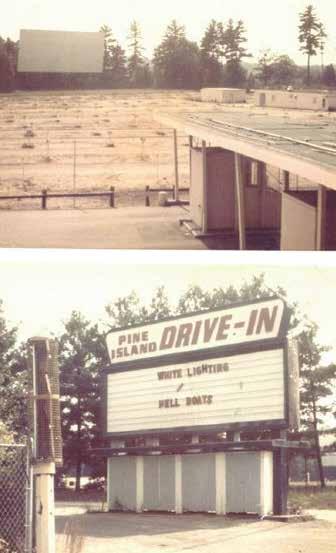
Bill Butts is the vice president of client relations and sales at Outdoor Pride, a landscape and snow management company headquartered in Manchester and serving commercial clients throughout New Hampshire and Massachusetts.
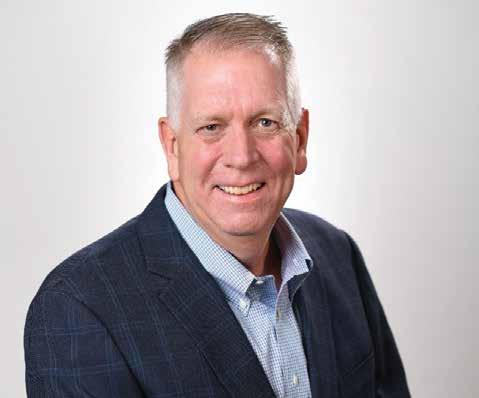
Explain your job and what it entails.
My job is to work with our clients and connect with them to make sure they understand the appreciation we have for their partnership. We call our clients ‘partners,’ and we like to be considered an extension of their team. Sometimes our conversations are very granular, like, ‘We need to show up at this time to plow’ or ‘We need to put this much mulch down,’ but I try to take a bigger … and more global look at how the partnership that we were able to build on over … the years has allowed everybody to grow and the properties to look great. … There’s a big need for some of these companies to really represent their brand, and a lot of times … the way their property looks is a representation of their brand, so I work with them to make sure that [that representation] is fulfilled. I also oversee new business development and sales for our company, and I help our business developers and account managers to procure new work and add work to existing contracts.
How long have you had this job?
This is my 35th year working in sales … and my whole career has been [sales in] commercial landscape and snow management. This is my fourth year working at outdoor Pride.
What led you to this career field and your current job?
Where I grew up, there was a golf course that was down the street from our property … and they gave me a chance to work there part-time. … That’s when I started to appreciate grounds and the maintenance of grounds, and I just kind of stayed with it.
What kind of education or training did you need?
I studied business management in college and really felt like my handson knowledge [from working at] the golf course and my business knowledge from college was a good combination to stay in the landscaping industry. … There’s a lot of hands-on training that goes with this industry … that you get not from school or an educational curriculum, but just from being around and in the outdoors. … There are a number of certifications and programs that you can do, and I’ve been able to take courses, like courses that are horticultural-based and ones that are snow-management based.
What is your typical at-work uniform or attire?
I try to match my clients’ dress, and, over the years my clients have started to put away the sport coat and tie and go more casual, like khakis and a polo. … It also has to be something that’s comfortable and allows us to do our job, which a lot of times [involves] having to walk around the properties on hot summer days or be out in the winter during a snow event.
How has your job changed over the course of the pandemic?
I’ve always been a face-to-face, handshake person, and the pandemic kind of took that physical presentation piece away for a bit. It seems to be coming back now, but for a couple of years we were entirely remote. … That’s difficult in my business, because a lot of what I’m selling is trust and confidence, so not being able to meet and deliver my company pitch face to face may leave a little bit of a gap.
What do you wish you’d known at the beginning of your career?
I wish I knew the [large] number of opportunities this industry has to offer. … I don’t think I really knew, when I started my career, that I could be what I am today, a vice president of client relations. … That might have given me a little bit of a different perspective.
What do you wish other people knew about your job?
A lot of people see me as someone who plays a lot of golf and has a lot of free time, but that piece of the business — the networking — is what I consider to be one of my strengths. It’s the ability to talk to somebody in a non-work setting and learn about their business
and their needs and wants and how you can provide for them. … Also, I still have to get my [office] work done, so spending that casual time with clients during [the work day] means I have to work a lot of long hours and nights and evenings.
What was the first job you ever had?
Working at the golf course, raking sand traps. I would get a dollar a trap.
What’s the best piece of work-related advice you’ve ever received?
Treat your customers and your employees like family, and you’ll never really have any issues with growing your business or growing your team.
—Angie SykenyFavorite book : The Dynasty by Jeff Benedict
Favorite movie: Lone Survivor
Favorite music: I lean toward country.
Favorite food: Marinated steak tips
Favorite thing about NH: The people are laid back.
Looking to get involved in your community? Here are some area organizations looking for volunteers. Get your group included by sending all the details (including what your group does, what projects or events you are seeking volunteers for and how people should get in contact) to news@hippopress.com.
• American Red Cross New Hampshire Chapter (the Northern New england Regional Headquarters is at 2 Maitland St. in Concord; redcross.org/nne, 225-6697) report that their most needed volunteer positions are the shelter support teams (volunteers who help residents during largescale disasters), disaster health services teams (for volunteers who are licensed health care providers) and disaster action teams (for smaller disasters, such as home fires), according to an April press release. The Red Cross is also seeking blood donor ambassadors who check blood donors in to appointments, answer questions and give out snacks, the press release said. The Red Cross also needs transportation specialists who deliver blood to hospitals from Red Cross facilities, the release said. The Red Cross provides training for volunteers, the release said. See redcross.org/ volunteertoday
• Aviation Museum of NH (27 Navigator Road in Londonderry; nhahs.org, 669-4280) is seeking volunteer mentors to help students at the Manchester School of Technology build a working, flying airplane, “a Van’s Aircraft RV-12iS two-seat light sport aircraft, a popular kitbased ‘home-built’ mode,” according to a press release. “Volunteer mentors aren’t required to have professional aviation or mechanical backgrounds, but should be familiar with basic shop tools and procedures. Training will be provided on more specialized equipment and processes. Weekday availability is key, as the planebuild project takes place during school hours. Also, all volunteers must undergo school district background checks,” the release said. Contact Leah Dearborn at ldearborn@nhahs.org or 669-4877.
• Black Heritage Trail of New Hampshire (222 Court St. in Portsmouth; 570-8469, blackheritagetrailnh.org) offers volunteer opportunities on specific projects or areas of expertise and with public interaction positions (such as event greeter and trail
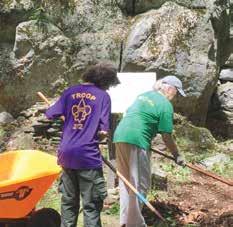
guide), according to the website, where you can submit a form describing your interests.
• Black Ice Pond Hockey (blackicepondhockey.com, info@blackicepondhockey.com) helps out in advance of and during the annual three-day outdoor hockey tournament in Concord (usually in the January-February time frame). See the website to fill out the volunteer application to help with work in merchandise, sales, player check-in, shoveling, ice maintenance, scoring, setup and more.
• Canterbury Shaker Village (288 Shaker Road in Canterbury; shakers.org, 783-9511) seeks volunteers to help out in the garden, give tours, offer administrative assistance, help with special events and more, according to the website. Go online to fill out an application or reach out to 783-9511, ext. 202, or jlessard@shakers. org, the website said.
• Capitol Center for the Arts (Chubb Theatre at 44 S. Main St. in Concord, Bank of NH Stage at 16 S. Main St. in Concord; ccanh.com) uses volunteers at events for “patron comfort and safety, before, after and during a performance” according to the website. Sign up online, where you can specify your volunteering interests and times of availability.
• The CareGivers NH (700 e. Industrial Park Drive in Manchester; caregiversnh. org, 622-4948), a program of Catholic Charities, offers transportation, help with grocery shopping and getting food, visits and reassurance calls to elderly and disabled people in the greater Manchester and Nashua areas, according to the website. Volunteers are needed to provide transportation and deliver food as well as to help with administrative work and in the warehouse, the website said. Go online to download the volunteer application and to see detailed frequently asked questions.
• CASA of New Hampshire (casanh. org), “a nonprofit that trains volunteers to advocate for children who have experienced abuse and neglect,” holds virtual information sessions when staff members and an active volunteer will provide information and answer questions, according to a press release (see the schedule at CASA’s website). Volunteer advocates participate in a 40-hour training course and are then
supported by a peer coordinator and program manager, according to the website, where you can apply and find information on CASA fundraising events.
• Educational Farm at Joppa Hill (174 Joppa Hill Road in Bedford; theeducationalfarm.org, 472-4724) has a variety of animal-specific volunteer opportunities (“chicken caretaker” and “duck docent” for example) as well as positions related to gardening and farm maintenance (“Marvelous Mucker”), fundraising and more; see the website for the listings, which include the specific person to contact for each position and a rundown of the responsibilities.
• The Franco-American Centre (100 Saint Anselm Drive, Sullivan Arena, in Manchester; 641-7114, facnh.com), which promotes French language, culture and heritage, seeks volunteers for work including marketing and communications, social media and grant research/writing, according to the website. Some French language skills are helpful but not required, the website said.
• International Institute of New England (iine.org, 647-1500), whose mission “is to create opportunities for refugees and immigrants to succeed through resettlement, education, career advancement and pathways to citizenship,” according to the website, offers volunteer opportunities including help with Afghan refugee and evacuee resettlement, english for speakers of other languages support, youth mentoring and career mentoring. Go online to fill out the volunteer form.
• Intown Concord (intownconcord.org, 226-2150) has volunteer opportunities including working within the Intown organization and helping with special events. Go online or contact info@IntownConcord.org.
• Jetpack Comics (37 N. Main St. in Rochester; jetpackcomics.com, 330-9636) has volunteer opportunities for Free Comic Book Day, the annual celebration of comic books usually held the first Saturday in May, which Jetpack organizes in Rochester as a multi-location event. (Perks to volunteers who help out all day include all the special comics released that year, a patch, food and more, according to the website). Jetpack has other volunteer opportunities throughout the year as well; contact jetpackcomics@gmail.com.
• John Hay Estate at The Fells (456 Route 103A in Newbury; thefells.org, 763-4789) offers volunteer opportunities including working at the Gatehouse office, helping the education department with historical and art exhibits, working at the shop or the main house, maintaining the facilities, gardening and working on special events, according to the website, where you can find a detailed description of some of the gardening and other work. Call the Fells, ext. 3, to speak with member services.
• Lowell Summer Music Series (lowellsummermusic.org) is seeking volunteers to work for the series director doing ticketing, admissions, customer ser-
Beaver Brook Association (117 Ridge Road in Hollis; beaverbrook. org, 465-7787), a nature center featuring more than 35 miles of trails across more than 2,000 acres of forest, fields and wetlands within the towns of Hollis, Brookline and Milford, has a variety of volunteer opportunities, including building and installing nesting boxes on the Nesting Box Trail, building Little Lending Libraries for Maple Hill Farm, gardening, working with supplies, working at outdoor events, helping with trail maintenance, painting buildings and other facilities and more, according to its website. Go online to fill out a volunteer application, where you can indicate your interests and availability, or contact the office Monday through Friday between 9 a.m. and 3 p.m.
vice and audience relations, usually from 5 to 10 p.m. (during shows), according to an April email. Go online to fill out a volunteer form.
• Manchester Historic Association (Millyard Museum is at 200 Bedford St. in Manchester, Research Center is at 129 Amherst St.; manchesterhistoric.org, 622-7531) offers volunteer opportunities including working at the front desk and gift shop at the Millyard Museum and helping with programs, tours and events, according to the website, where you can download a volunteer application. Call or email history@manchesterhistoric.org with questions.
• McAuliffe-Shepard Discovery Center (2 Institute Drive in Concord; starhop. com, 271-7827) has opportunities for volunteer positions including school group educator, docent, helping with events, exhibit maintenance, grounds maintenance (including gardening) and more, according to the website, where you can also find volunteer perks. Contact kthompson@starhop.com for information.
• NAMI NH (naminh.org, 800-2426264) has volunteer opportunities related to advocacy, support groups and family-to-family programs as well as work on events, such as the NAMI Walks NH 5K, according to the website, where you can find applications and more details for specific programs (including the specific program’s contact). or reach out to volunteer@naminh.org or 225-5359, ext. 322.
• New Hampshire Film Festival (nhfilmfestival.com) takes volunteer applications to work its annual festival, held in october. “All volunteers will receive tickets to screenings, an NHFF T-shirt, and the staff’s undying gratitude!” — so says the festival’s website. Volunteer opportunities include positions working on the prep as well as the execution of the event. Fill
out the application, where you can indicate your desired level of volunteering, or contact team@nhfilmfestival.com with questions.
• New Hampshire Food Bank (700 east Industrial Drive in Manchester; nhfoodbank.org, 669-9725) has group and individual volunteer opportunities, which include working at mobile food pantries, working at the food bank’s garden April through November, working at the Saturday morning food drops at JFK Coliseum in Manchester and working at the food bank facility, according to the website, where you can sign up to volunteer and see a calendar of when and where help is needed. or contact 669-9725, ext. 1131, or email volunteercoordinator@nhfoodbank.org.
• NH Audubon (nhaudubon.org) has several volunteer positions posted on its website, including volunteer gardeners at the Pollinator Garden at the McLane Center in Concord (contact ddeluca@nhaudubon. org); a New Hampshire Bird Records office assistant in the Concord office (contact rsuomala@nhaudubon.org); a Backyard Winter Bird Survey project assistant (contact rsuomala@nhaudubon.org); an eBird data assistant (contact rsuomala@nhaudubon. org); wildlife volunteer field surveys; the grant program research assistant and a publication assistant, according to the website.
• NH Boat Museum (399 Center St. in Wolfeboro Falls; nhbm.org, 569-4554) offers volunteer opportunities including working at special events and fundraisers (including the Alton Bay Boat Show), office work, working with the exhibits, helping with educational programs, building and grounds care and maintenance and more. Sign up online, where you can select your areas of interest, or contact programs@nhbm.org.
• NH PBS (nhpbs.org) has several vol-
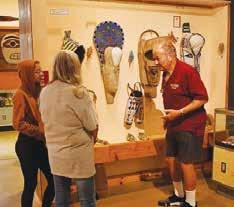
(18 Highlawn Road in Warner; indianmuseum.org, 456-2600) a museum and cultural center celebrating past and present Native American culture, has volunteer opportunities such as giving tours, helping to organize events and doing office work and grounds work, according to its website. Contact volunteer@indianmuseum.org to learn more.
unteer opportunities including auction volunteer, creative services volunteer, membership department, and NHPBS Kids Writers Contest and our Hometown Program Development manager, according to the website. Go online to fill out a volunteer form that includes designating your availability and special skills and interests.
• N.H. Preservation Alliance (7 eagle Square in Concord; nhpreservation.org, 224-2281) needs volunteers on an occasional basis to help produce educational events and to help with public programs such as tours, barn heritage celebrations or on-site preservation trades demonstrations, according to an email from the group’s executive director. Contact admin@nhpreservation.org to indicate what you’d like to help with and whether you are comfortable in both indoor and outdoor settings, the email said.
• NH State Parks (nhstateparks.org) has volunteer groups that hold volunteer work days throughout the year, according to the volunteer program director at the state’s Department of Natural Cultural Resources’ Division of Parks and Recreation. Find groups that work on specific parks at nhstateparks.org/about-us/support/volunteer (such as the Derry Trail Riders who work on Bear Brook State Park or the Surf Rider Foundation, which works on Hampton Beach State Park). or contact volunteer@dncr.nh.gov.
• The Northeast Organic Farming Association of New Hampshire (nofanh. org) seeks volunteers with planning their annual Winter Conference, assisting with spring bulk order pickup, and committee and board membership, according to the website. Go online to fill out a volunteer form or contact program coordinator Laura Angers at info@nofanh.org.
• Park Theatre (19 Main St. in Jaffrey; theparktheatre.org, 532-9300) has volunteer opportunities for ushers as well as work in concessions, parking, office work, fundraising, marketing, stage production and more, according to the website, where you can fill out an online application where you can indicate your interests and availability. Call or email info@theparktheatre.org with questions.
• Pope Memorial SPCA of Concord-Merrimack County (94 Silk Farm
Road in Concord; popememorialspca.org, 856-8756) holds regular volunteer orientations (pre-registration is required) with volunteer opportunities including small animal care and socialization, dog enrichment, dog park assistance and workroom assistance, according to the website. Go online to submit a volunteer application or to ask questions of the volunteer coordinator.
• Special Olympics New Hampshire (sonh.org) volunteers can serve as coaches, trainers, event organizers, fundraisers, managers and unified partners who play alongside some athletes, according to the website. Volunteers can work at an event or with a team, the website said. For more information contact specialolympics@ sonh.org or call 624-1250.
• United Way of Greater Nashua (unitedwaynashua.org, 882-4011) is seeking volunteers for its Pop Up Pantries; specifically it is looking for someone to help distribute food on Tuesdays from 11 a.m. to 12:30 p.m. at River Pines Mobile Home Park in Nashua, according to an April press release. The United Way also has volunteer opportunities related to one-day events or fundraisers, work on committees within the organization (such as on finance or marketing) and in groups such as the Stay United group, a 50+ volunteerism group, according to the organization’s website. The organization also helped to put together a website, volunteergreaternashua.org, featuring volunteer opportunities from other area nonprofits.
• Young Inventors’ Program (unh.edu/ leitzel-center/young-inventors-program) uses volunteers to support its annual Northern New england Invention Convention event (held this year in March), according to program director Tina White, whom you can contact at Tina.White@unh.edu (or see unh.edu/leitzel-center/young-inventors-program/connect/volunteer). The program is a partner of the University of New Hampshire and UNH extension, where there are more opportunities for volunteers interested in STeM youth programming, she said. See extension.unh. edu/educators/4-h-stem-docents for information on the 4-H STeM Docent program, which builds and trains volunteers to help with educating New Hampshire K-12 youth in science, technology, engineering and mathematics projects, White said in an email. Contact Megan.Glenn@unh.edu for more information on that program.
Welcome to the Viking House. established in 1983, the Viking House has truly become a destination shop. As we approach 40 years in business, our enthusiasm continues to grow as we share this incredibly special place that has become such an important stop when you are visiting downtown Concord.

Featuring a delightful selection of gifts from more than 10 Northern european countries, as well as a few items made in the U.S. and Canada, you are bound to find the perfect gift for that upcoming wedding or holiday celebration or treasure for someone special. our goal has been to bring you beautiful products that you would find if you were wandering around the shops in europe.






The Christmas season is an extra special time here in the shop. We are unpacking boxes at a rate that would impress even Santa and his elves. These items have traveled so far to grace our shelves, and many are ordered a year in advance and are lovingly made by hand. Beautiful Christmas pyramids, nutcrackers, incense smokers and ornaments from Germany are a definite favorite. We also love helping you start a new tradition in your household. How about a Christmas pickle to hide on your tree? Hide one of these hand blown glass pickles in the branches of your tree, then let everyone hunt for it on Christmas morning. The first to find it gets to open a special gift, hold bragging rights for finding the pickle first or gets to open the first present.





We have so many advent calendars to choose from, and these are always special as well. Hide a little treat behind each door of our wooden calendars, open a little window each day to reveal a special picture on our paper ones, or treat yourself to a piece of caramel or a delicious piece of German chocolate with our food advent calendars. Christmas crackers from england are also lots of fun. Place one of these beautifully decorated paper tubes at everyone’s place at the dinner table and tug on the ends for a pop to reveal a special surprise inside. each contains a paper crown to wear, sometimes a joke or words of wisdom

for the upcoming year and a little gift. We even have crackers containing things like wind-up reindeer or snowmen. Who wouldn’t enjoy a wind-up toy race?

While you are here, be sure to grab a delicious treat from our extensive assortment of imported european food. We have delicious goodies ranging from chocolates, candy, cookies, cakes, beverages, meats, cheeses — the list goes on and on. We especially enjoy the holiday season and think you will too. our shelves are nearly bursting with extra special holiday goodies like stollen and marzipan from Germany, mince pies and Christmas puddings from england, korv (Swedish potato sausages) and Swedish meatballs, Stroopwafels from Holland, over 40 varieties of european licorice — oh my, this list makes us hungry!

Another favorite treat here are the tins of pepparkakor cookies, a delicate and delicious ginger cookie from Sweden. We have heard these referred to as “wish cookies” — just place a cookie in the palm of one hand, close your eyes, make a wish and push down on the cookie with one finger. If the cookie breaks into three pieces, your wish will come true. We can’t promise it, but no matter what, there is still a cookie to enjoy.

We truly hope you will come and visit us during the holiday season, and we look forward to becoming a part of your holiday traditions for years to come.


Remember, when you visit the Viking House, europe is closer than you think!

Fortunately, today there are many choices for retirement living. one popular choice is a Continuing Care Retirement Community (CCRC), also called a Lifecare or Life Plan Community. These communities are primarily not-for-profit, but despite the fact that there are 1,900 across the U.S., and the model has been around for 100 years, they are often misunderstood. So, here are some facts about this concept from RiverWoods, the largest family of notfor-profit CCRCs in northern New england, founded by a group of local residents in 1994.
Continuing Care Retirement Communities are beautiful residential communities but are actually classified as an insurance product. The key is that you choose to move in when you are independent and able to live safely on your own (age 62 or better). As an independent resident, you enjoy chef-prepared meals, housekeeping services, social and fitness opportunities, complimentary transportation, and planned outings, as well as all home maintenance.
you have the time to do what you enjoy and get the benefit of meeting new friends. Meanwhile, as a resident, if your health needs change over time, you can access health care. Not all CCRCs are the same, but several, such as RiverWoods, offer multiple levels of care, including Assisted Living, Memory Support and Nursing Care, which are provided within the community, at a price well below market rate. Best of all, you are cared for by people you know and trust.
o ne of the biggest benefits of a CCRC is knowing that you are in control of your future. In this increasingly complex medical world, you have already made the plans for what will happen if you need care in the future. It’s a gift to you and to your children.
Choosing a CCRC is also a smart financial decision. Moving to a community while you are still independent means you’ve planned for additional levels of care. It is important to do your research and check your contract, as every contract is different. Many Life Plan Communities offer a refundable contract option, which returns a portion of your entrance fee to your estate when you pass away. There is only one contract in New e ngland that provides the opportunity to use your refundable option during your lifetime — RiverWoods Manchester.
Their innovative 70 percent flex contract allows you to use your refundable portion of your entrance fee to cove r health care costs.
We can’t talk financial advantages without mentioning the tax benefits.
A CCRC is considered pre-paying for your future health care needs. As a result, a portion of the entrance fee and monthly service fees are tax deductible.
This is a big decision, so do your research. evaluate each community to carefully consider whether the contract and level of insurance is a good fit for you. you will likely live longer

than any prior generation, remain more active and have more choices than any other generation. Make a plan so that your next chapter is all that you could wish for.
RiverWoods Manchester is thrilled to announce the construction of 18 cottages. Pre-sale is now underway, with construction slated to begin in the spring of 2023. Discover RiverWoods Manchester, located at 200 Alliance Way in Manchester, and schedule a tour today. Call 836-2302 or visit rwmanchester.org.
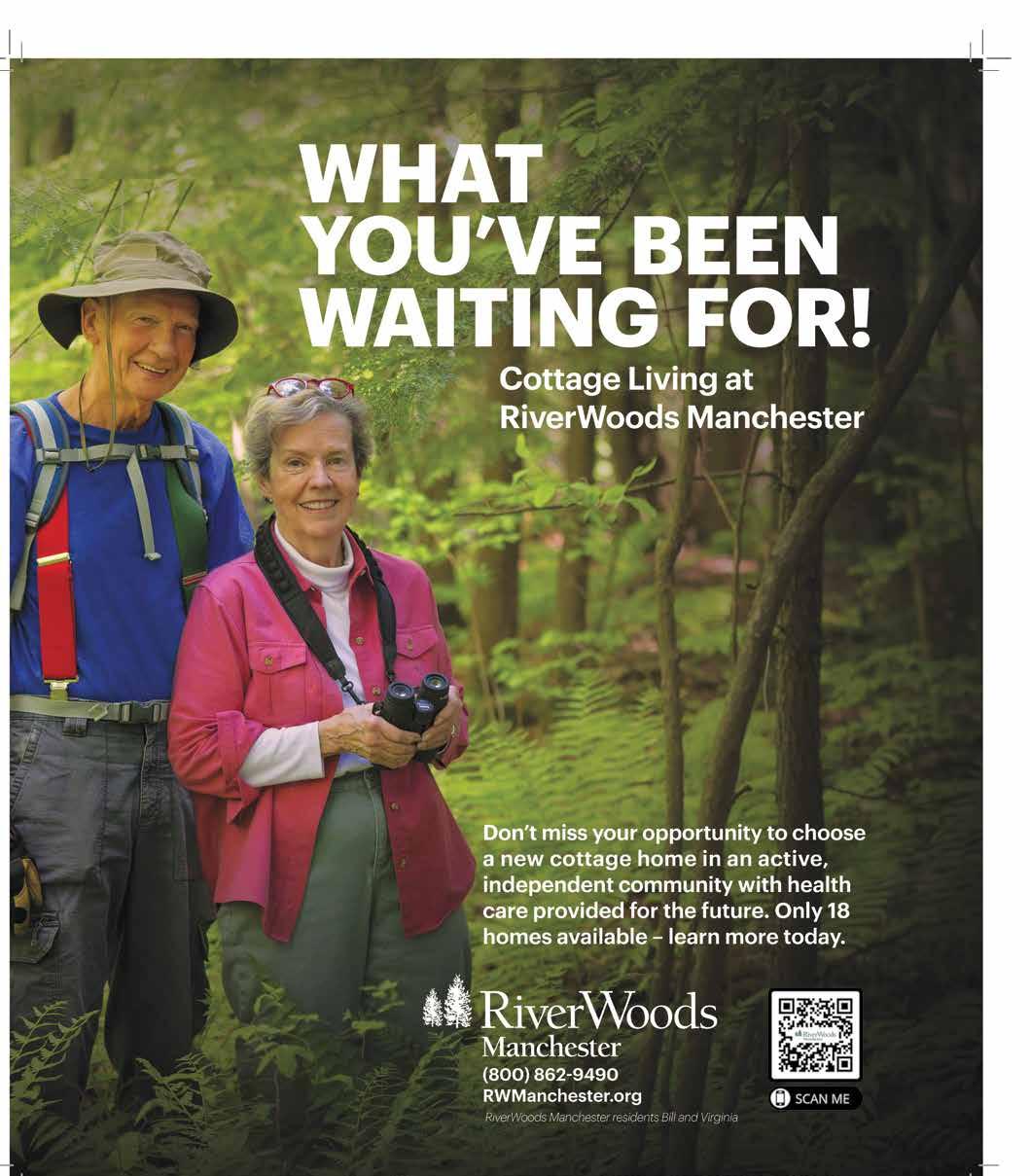
The Currier Museum of Art offers online and in-person classes for all ages and abilities inspired by the museum's permanent collection and special exhibitions.


Visit currier.org/classes for full list of classes and to sign up. Discounts available for members.
Pastel Painting Weathered Barns

Online five-week class
Nov 4, 11, 18, Dec 2, 9 2 pm to 4 pm
This class will bring old barns center stage, with all their character and imperfections
You will use pastels to paint weathered barns and the beautiful landscapes that frame them, using the principles of value and composition
Along the way, learn to take reference photos, crop and find the best composition, and the importance of value and the basics of perspective
All levels welcome
Drypoint Prints with Kate Hanlon

In-person workshop Saturday, November 5 10:30 am to 3:30 pm
The simplest way to create an intaglio print is to scratch into the surface of a copper plate with a sharp needle
Drypoint prints are recognized by soft, velvety lines, and artists from Rembrandt to Bourgeois have been drawn to this method
to express their ideas
Follow in their footsteps and create your own drypoint prints, learning to scribe, ink and wipe the plate, and print on our printing press.
Drawing in the Galleries with John & Rachael O'Shaughnessy
In-person five-week class
Nov 10, 17, Dec 1, 8, 15 5:30 pm to 7:30 pm
A curiosity and love of art, along with a drawing pencil and paper are all you need for this exciting new drawing class at the museum
Students will draw by looking directly from the Currier’s Permanent collection
Your instructors will guide you in a warm and inviting environment by giving one-on-one instruction and feedback, while learning each week about the master artists and the art in the collection